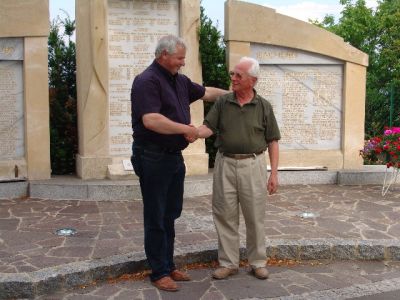Back in Vienna we visit the hospital where I was born days after my parents fled Hungary during the revolution in 1956. My mother was 9 months pregnant. And with their not-quite-ten-year-old son in hand, they snuck across the border to Austria while being shot at by border guards. But that's another story. Tomorrow, we fly home to L.A.
My first trip to Austria happened in early 1945, in a death march, escorted by brutal, specially trained, Hungarian military police attachment.
The second trip to Austria was in a family setting in not quite usual travel way and time. The time was in 1956, during the Hungarian revolution. For a brief period of time, the border between Hungary and Austria were open, free to cross.
Hundreds of thousand people took the opportunity and flee from Communist Hungary to freedom to the West. We as a small family were among them. The family composed of: my wife Anna, my son David, Anna’s cousin Elizabeth, Elizabeth’s friend John and me. On November fifteenth, we traveled by train from Budapest to the Austrian border. We traveled by railroad on the Budapest, Györ, Sopron, Ebenfurt line. On the train we learned that the shorter distance between a Hungarian village and an Austrian village would be at Kópháza to Deutschkreutz. So we left the train at Kópháza station and crossed the border by foot, to the Austrian village of Deutschkreutz. We were welcomed with great hospitality by the local Austrian people. From here we went to Vienna to obtain traveling papers to the United States of America. On December seventh, we were standing ready at the Vienna airport to continue our trip to the U.S.A. when nature called and Anna had to be rushed to the hospital, where she gave birth to Ron. After a short delay, on December twenty-first, we embarked to make the overseas trip. We arrived in the U.S.A. on the twenty-second of December. And we greeted the New Year of 1957, as resident’s of Brooklyn, NY.
On Saturday, June 18th, we met Dr. Lappin’s husband, Dr. Peter Eppel, he is curator of the Wien Museum in Vienna. He was busily working to create an exhibit in the museum to commemorate the influx of Hungarian refugees and their lives during and shortly after the Hungarian revolution in 1956. The exhibit is slated to open late fall of 2006, on the 50th anniversary of the 1956 events. With Dr. Eppel we talked about our personal experiences during our stay in Austria. I promised to him that I would send artifacts for use in the exhibition, which I did. This contact led to further correspondence between us.
Sunday, June 19th, we flew back to America. In one short week we revisited some of the utmost important places in my life’s history. We met with extraordinary people with whom we forged new relationships.
In early July, after returning home from the Austrian trip, I wrote a letter to Mayor Josef Weinhandl:
My extraordinary trip had come to its conclusion and I am back home again. Your leadership in organizing the daily activities of my visit to St. Anna made my trip very successful. During my very brief stay in St. Anna I was able to see that you govern your town with a wink of an eye, with a slight movement of the arms, with motion in body language just like the great conductors getting the 100-plus members of the philharmonics to play in harmony and create a memorable musical event.
Most every leader who commands great performances has an equally great and loving spouse for advice and support. You are blessed with a loving and caring wife.
My father was successful; he had my mother, a loving, caring and supporting wife.
My sons reached and maintain top positions in their chosen fields. They have loving supporting wives.
I was successful in engineering. Anna was that kind of wife.
I am successful in my volunteer job in the clinic where Anna was treated. The doctors and the nurses treated her with love and with the utmost care. I am successful because I feel that the love of my departed wife is still surrounds me there.
During my stay in St. Anna, being in your company, any time a local citizen came over to discuss something with you, I felt the respect you received as a ray of light. I felt the edge of that beam brushed away just at my side.
With your help I was able to thank the local citizenry for their extraordinary generosity and humanity toward helping the Hungarian–Jewish Forced Laborers, including me, in the early part of the year 1945.
During the photo session in front of the WWII memorial, you and me, we shook hands without words. I looked in your eyes; you looked in my eyes. Silently I expressed my gratitude for your tremendous efforts to unearth NAZI atrocities and -- in contrast -- the good heroic deeds your people exhibited toward the oppressed Jews. Your eyes acknowledged my gratitude and pledged the continuation of the unearthing process to record the historical facts of your "Marktgemeinde" versus the NAZI madness. (Instead of handshake I would have hugged you, but I was afraid of creating embarrassment.)
Thanks for your gracious hospitality,

7. Handshake with the Mayor.

